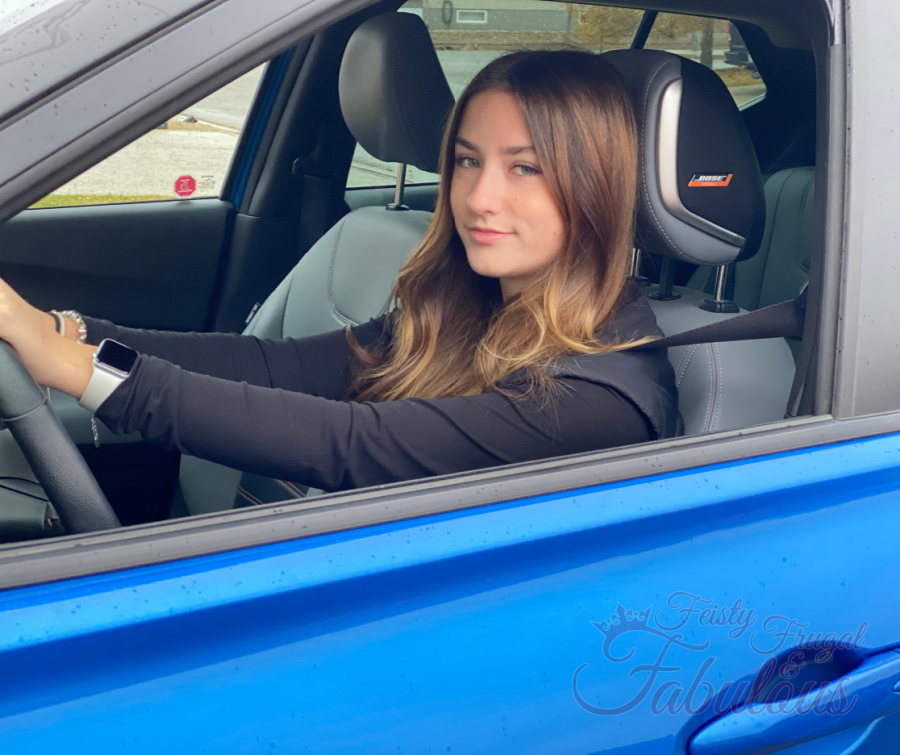
Adding to the list of all the things those baby books didn’t include – how on earth does any mother (and father…but I think moms struggle the most) keep calm when their baby (ok teenager) gets behind the wheel without them and starts driving alone? How do we convince ourselves that the driving instructors covered everything (and concluded they had the skills to pass the test), that we covered everything else, and that nothing terrible is going to happen?
The answer is…you don’t. You don’t truly convince yourself of all the things. Like most things we encounter in parenting teenagers, you hope you’ve done your part and trust that your teenager has listened and learned. And then we wait.
I shared my own experience and thoughts on a recent CTV Morning Live Saskatchewan segment here:
I’m a little more seasoned in this experience, as my oldest is 19 now (4 when I started this blog) and we went through our first winter of him driving alone already. Sure, it was in the pandemic so the car was mostly empty which helped but we’ve been there, done that, and our neighbors even had a patch of grass taken out from their front lawn when our son slid on ice and the car came to a stop on the front lawn. It happens.
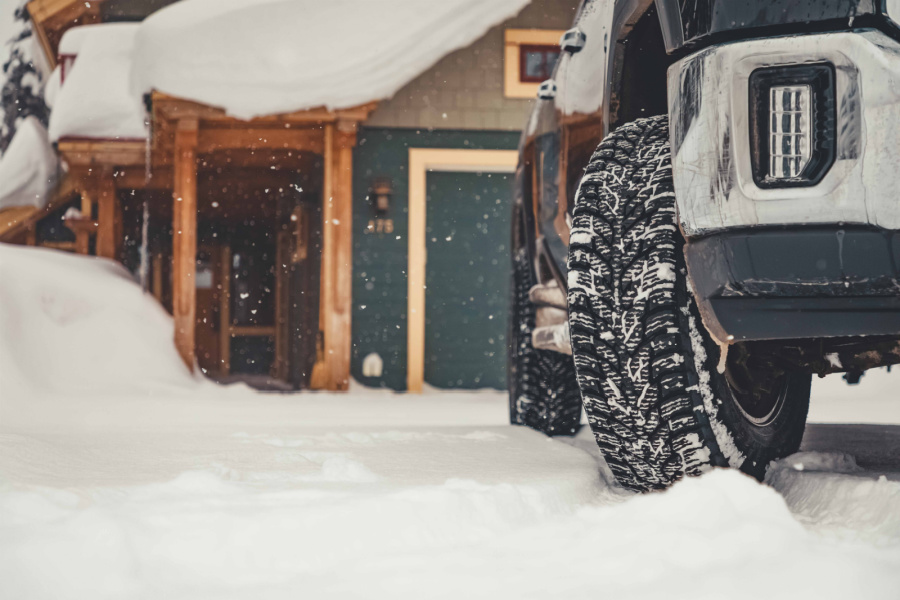
With winter fast approaching and my middle child getting her driver’s license in early December, covering those important winter driving tips is top of mind! While we can’t possibly cover everything there is to know about winter driving (and our teenagers likely zone out about 5 minutes in), here are some basics to cover ahead of time.
Check Yo-Self
Ensure your vehicle is ready for winter by topping up fluids (windshield washer fluid is important on gross fall/winter days when the weather can’t decide what it wants to do), checking your headlights and brake lights, checking to ensure your brakes are in prime condition, checking the windshield wipers are working efficiently (hot summer weather can actually break down the rubber in them, who knew?) and prepare a car emergency kit – beyond jumper cables, extra gloves and a blanket ensure you include snack bars and bottles of water.
Also, check the air pressure in your tires when the temperature drops (cold air can make the pressure in your tire drop significantly, affecting your vehicle’s ability to bite ice and snow). Not sure how to do that? Me neither! You can visit any Kal-Tire location and they’ll check your tires and add air if needed, for free!
Plan Ahead
I know, asking a teenager (especially one with keys in their hands and newfound freedom) to take a breath and plan ahead is a big ask but it’s important that teens remember they’ll need to account for extra time on winter school mornings especially. Weather can impact the commute significantly and I promise my teen – her teacher isn’t going to freak out if she’s late because the roads aren’t great. But if it happens every day, they have a reason to side-eye you.
Planning ahead also means having an ice scraper (and second set of winter gloves in the car) to clear off all windows so your new driver can see clearly. Do not let your teen start a terrible habit of being a person who clears only a small area and looks like they’re driving an igloo – not only is it very unsafe, it can also result in a ticket.
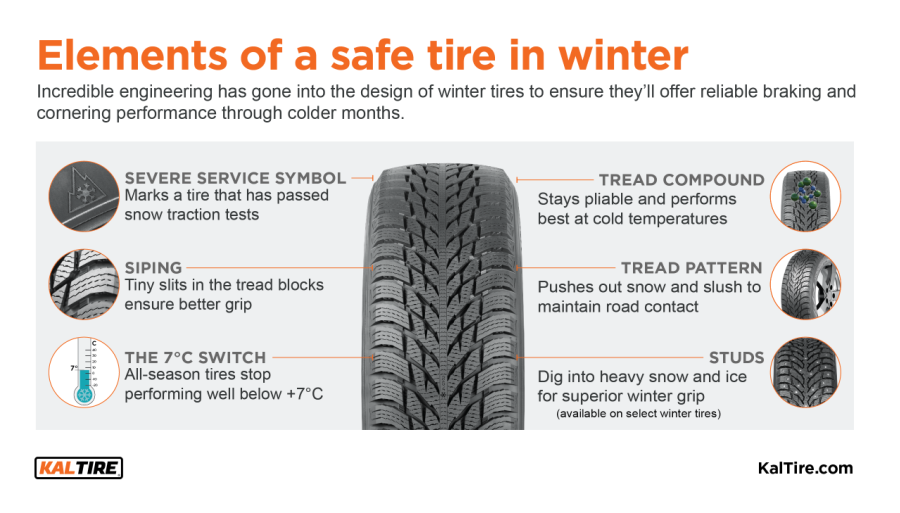
Winter Tires
If your kids grow up with seasonal tire switch-outs being a thing, it’s something they’ll carry on years down the road. If not, they’ll learn the hard way like many of us (myself included) have. My dad kept the same tires year-round, and my first few winters were spent gripping the wheel and sliding to school. As a family today, we switch to winter tires when the average temperature daily hits 7 degrees (the 7 degree switch!) I explain to the kids that all-season tires are not exactly that. All-seasons are like wearing the same pair of running shoes year-round, to the beach and then to the ski hill.
The specialized rubber compound in your winter tires allows them to stay flexible and grip snow and ice for optimum traction. Due to the unique rubber makeup, summer months degrade winter tires quickly. Saskatchewan isn’t a province where all-season tires can thrive. It just isn’t.
To learn more about winter compounds, check out, What happens when you use winter tires year round For the best traction, make sure you also have sufficient tread depth on your tires. Unsure of how to check? Read, How to Measure Tread Depth on Your Tires for tips and on what each tread depth level means.
Practice Makes Perfect (…and makes grey hair)
Take your new driver to an empty parking lot to practice driving on ice and snow as early as you can. Learning how your vehicle responds to snow and ice, how to maneuver out of a skid, etc., are important things for a new driver to learn with a parent beside them.
None of this is fun, but neither were those first solo swimming lessons without you in the pool or letting go of the bike seat as they wobbled away. It sucks, parents, I know. But the rewards after are of course more than worth it (no more late night pick-ups!) even if we’re still going to be awake waiting up for them to come through the door anyway.

My friends at Kal-Tire have happily set aside a Just In Case Emergency Car kit for one of my readers (I’ve got one in our family vehicle as well!) It includes things like an 8 foot, 10 gauge jumper cable, flashlight with batteries, 12ft tow strap, rain poncho, pair of knit gloves, a first-aid kit and more!
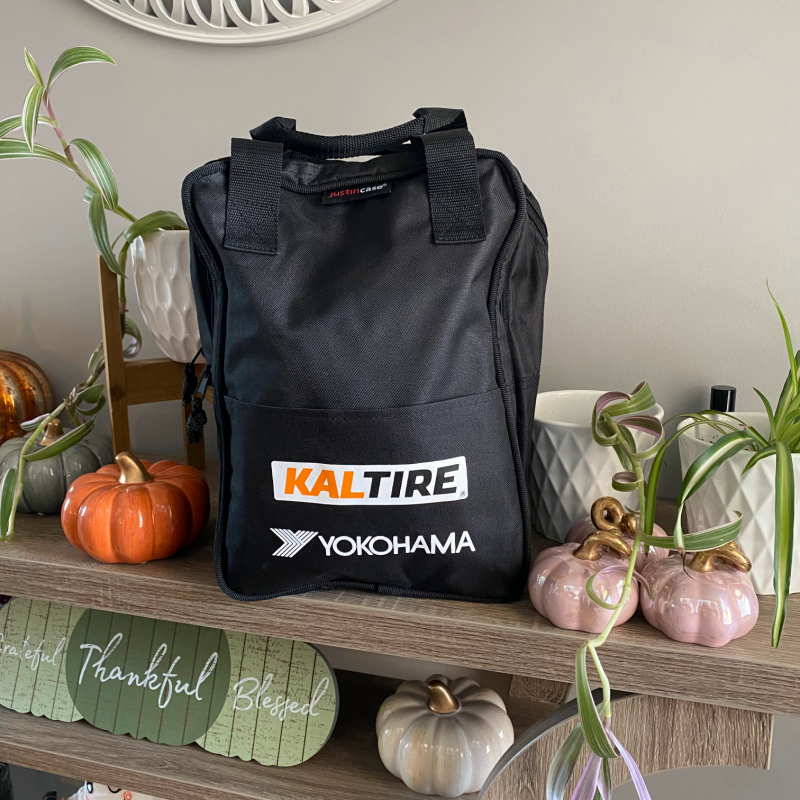



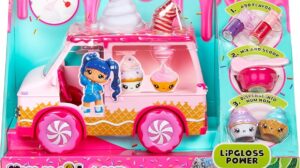


I could never sleep until my teenage girls got home, they were both good drivers but I always worried about the other idiots on the road!
I always worried until she was back home.
I do remember spending a lot of time in the mall parking lot with them when it was winter and thankfully they are all good drivers now.
I always keep an extra scraper in my trunk so a passenger can help me clear snow and ice. And I’ve already make an appt to change to winter tires as I know 7 degree weather will come quickly!
My son is starting drivers ed soon and I am very nervous! Roads are terrible here in winter but my husband is going to spend time teaching him to drive carefully this winter.
Had a teen driver and worried until he came home safe and sound. He’s now a professional driver and I still worry.
It was a trying experience with both my son and daughter but they did well and I was proud of them.
I remember my oldest when he got his license and I spent many a night worrying about him driving. I always told them to carry a blanket, a candle and matches in the car in the winter.
My oldest is studying to get her license at the beginning of the new year when she turns 16. I remember learning to drive and I remember that first drive in the snow in a parking lot. I was terrified and said, “I just won’t ever drive if it’s snowy out!” My dad convinced me to go out and do it though and I’m so glad he did!
The most important thing that I did when learning to drive was take drivers ed because they help to prepare you for all different types of situations
I haven’t experienced my own teenage driver, but I do remember my parents having me take a winter driving lesson to be safe and really learn to drive in the winter conditions
I can remember when my son and daughter started driving I signed them up for defensive driving courses to make them better drivers.
I loved learning how to drive as a teenager. I had a very safe environment to learn in ,Yorkton, and my Dad was a wonderful teacher. I’ve been a safe driver ever since I recieved my drivers license, and I still enjoy driving!
first it was my son driving, and now just recently it was my granddaughter…the worries never end!
I found the joy and fear at the same time when my kiddo got her license.
I found the joy of them finally driving themselves but I was also a bit worries at time. I know they were both responsible ect… but so young.
Both my son and daughter took young drivers course. I still stayed up until they arrived home.
My kid is only 12 now so it’s something for me to look forward to! Sigh.
Definitely did not experience joy when my son started driving. The anxiety! He is now 21 and when he’s going for long drives or far away I still give him the safety talk and ask that he texts me when he gets to his destination.
Get out and drive as often as you can, on all types of roads. I remember my Dad taking me on the hwy and I was scared to death but today, I love hwy driving. I believe this is from being exposed to it at age 16.
I remember when my daughter was learning to drive, shortly after her 16th birthday. She went to Young Drivers of Canada & in addition to the standard on-the-road lessons, she was taught valuable safety awareness. She turned into a confident skilled driver, but I still worried every time she went out, until she got home safely.
As a new driver many years ago, I remember being so intimidated by bad weather conditions. My parents and driving instructors didnt think to let me experiece that when I was still learning and that made me anxious when I had drive in bad weather. My advise would be to try and let your child experience all that they can so they will be better prepared when theyre on their own.
I only recall the stress of teaching my teen, his car was a standard. I do know the worry never goes away.
My daughter got her license the day before it snowed this week. I have been nervous each time she has driven this week.